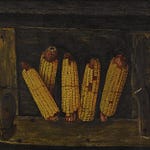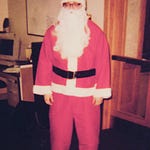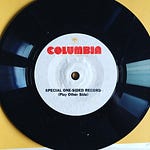1. Little League
Sometime after I turned five or six, my parents started signing me up for seasonal sports camps and teams. It wasn't mandatory, but while I’m sure I was asked, I’m also sure I didn’t put much thought into my answers. Life as a kid involves a lot of going along with whatever happens. One weekend I might watch Ninja Turtles and play Sonic the Hedgehog for hours, the next I would get up early to learn how to dribble.
Whatever the sport, whether it was practice or a tournament, and no matter the score, the coach always gave the same advice. Hustle. I assumed it meant "run," then learned it was a catchall term for "work." There were never any clear instructions about what to do on the field or the court beyond hustle. It was the mantra of adult authority figures. "Let's hustle," they said as we took the field. "Nice hustle" they said at halftime. "I saw you hustling out there," they said after the last whistle. Grown-ups love hustle. Hustle puts the ball in the net. Hustle wins the game. Hustle is all you need to get ahead.
Not quite.
Two-and-a-half decades of hustling and my generation is left with growing debt, a lousy job market, and a planet in crisis. And we keep hustling. Our devices hum with opportunities—or commands—to hustle. Hail a ride on Lyft and you'll see what you could make if you drove for them. Tap snooze on your smartphone alarm and you’ll find a few emails you may as well get a head start on responding to. Share a thought or a photo on social media and get invited to boost your post and reach more strangers. Stay on Zoom after work to have a happy hour. Turn your hobby into a small business (a side hustle) with Squarespace, Shopify, or some other startup.
Hustling is necessary because rent is higher than ever and mortgages take two incomes. When it pays off, the reward is never what it seems to be. Luxuries—fashionable clothes, good groceries, tasteful furniture—have been downgraded and dropshipped. Everything is made flimsier and thinner and sold at the brink of obsolescence on installment plans.
The thinness eventually shows through. We work hard, but something is lacking. Maybe it’s material reward. Maybe it’s seats at certain tables. Maybe it’s spiritual fulfillment—that vague feeling that’s only identifiable in its absence. Hustle hasn’t won us the ballgame, so we lose faith not only in the jobs, products, and services surrounding us, but in the system that brought them all to bear. It’s hard to find meaning in a world where we can take out a microloan to buy a bidet.
In the face of all this, some give in, some give up, and others settle somewhere in-between. The combination of recognition, rage, and resignation are traits of what’s now widely called millennial burnout. Exhaustion is our modern mood.
2. Boomer Has It
Of all the places where I might find commiseration, the 1983 movie The Big Chill was so low on the list it didn’t even register. Before watching, I only knew the movie’s reputation as yuppie apologia—a glorification of aging hippies who swapped protests for corporate partnerships, got rattled by reality, and took a few days to peer at their navels through a cloud of Motown and marijuana and just…think, man, about what it all really means. The pop culture legacy of The Big Chill, from my view, was of a younger generation saying “OK Boomer” in unison.
That isn’t entirely misplaced, but the movie is darker, more cynical, and more relatable than the reputation suggests.
By way of plot, The Big Chill is thin and straightforward. A group of friends who went to the University of Michigan in the late '60s reunite fifteen or so years later for the funeral of Alex, a friend who took his own life. When they meet, they realize they're all living with various levels of disappointment over how things turned out. They’re successful, but something is missing.
Meg (Mary Kay Place) wants a family. She gave up her job as a public defender for a cushy spot as a real estate lawyer, but is convinced that only a baby can make her whole. Karen (JoBeth Williams) has a family and still feels unfulfilled. She longs to ditch her nice-enough husband and hook up with her old friend Sam (Tom Berenger). Sam is an actor whose role in the cop show J.T. Lancer made him rich and famous, but it took so much time away from his family that his wife left him and took the kids. J.T. Lancer isn’t what anyone would consider good TV. Sam wonders if people laugh at him.
Unlike Sam, Michael (Jeff Goldblum) knows people laugh at him. He works at People magazine, where he’s forbidden from writing "anything longer than the average person can read during the average crap." He wants Sam’s money and fame, which he thinks will bring him respect.
Nick (William Hurt) doesn’t seem to want anything. He’s embraced the emptiness, giving up his Frasier-style radio show to deal drugs out of a beat-up Porsche. He's the type of nihilist who has thought of himself as a realist for so long that he can't tell the difference.
Harold (Kevin Kline) is just as cynical, but in a more cheerful way than Nick. He dismisses the friends’ activist past as a fruitless rejection of the privilege they were born into and would later embrace. Everything went right for him. He started a chain of running stores that he’s planning to sell to a big conglomerate. He married his college sweetheart Sarah (Glenn Close), who became a doctor. He’s friendly with the local police and has employees who call him “sir.” The movie is set in the house he bought after trading in his radical politics. When Sam arrives for the weekend, he marvels at the setup. “Who would have thought we'd both make so much bread—two revolutionaries?" he asks. Harold pats him on the back. “Good thing it's not important to us,” he says.
These characters aren’t especially sympathetic. My mistake going into the movie was thinking that it would be on their side. Director Lawrence Kasdan (who co-wrote the screenplay with Barbara Benedek) doesn’t shy away from portraying his characters as poor little rich kids. "No one ever had a cushier berth than we did,” Nick reminds the group one evening. And Kasdan doesn’t let the characters off the hook for the compromises they’ve made. One evening Michael, who has been hounding his friends to invest in his plan to quit the magazine and open a nightclub, says he’s aware that he can seem “nakedly opportunistic.” He insists this is a virtue. Everyone is selfish, he says, so dropping the facade of politeness is a more honest way to live. When Sam says that’s just a massive rationalization for bad behavior, Michael replies that rationalizations are essential for survival, even more so than sex. “I don't know anyone who could get through the day without two or three juicy rationalizations,” he says.
Everyone has their rationalizations. Nick’s nihilism is a rationalization for taking and dealing drugs. Karen thinks leaving her husband for Sam will help her get back into writing. Meg believes she has to abandon public service if she wants a family. Sam justifies his J.T. Lancer paychecks by saying he puts a message of social value into each episode.
These rationalizations aren’t justifications, though; they’re the characters’ excuses for giving up who they are to get where they are. The movie is about how hollow a reward is when it takes more than money or hard work to attain. In an early scene, Kasdan shows us a quick cut of the characters’ cars starting after Alex’s memorial service. The luxe European grilles rattle as the engines rev. When Kasdan moves to a wide shot, we see these high-price, high-performance signifiers of status lumber into an orderly line for a slow drive to the graveyard.
Later, Sam and Nick sneak into the kitchen for a midnight snack and bump into Karen’s husband Richard (Don Galloway). Richard says he’s been thinking about Alex and growing up.
"The thing about kids is they're instant priorities. You know you have to protect them and provide for them. Sometimes it means your life isn't exactly what you want it to be,” he says, eating what appears to be a mayonnaise sandwich. “There's some asshole at work you have to kowtow to and sometimes you find yourself doing things you never thought you'd do. But you try to minimize that stuff and be the best person you can be." As he reaches for his glass of milk, Richard finishes his rant. "Nobody said it was going to be fun. At least, nobody said it to me."
In other words: When you’re out on the field, you’re not there to have fun, you’re there to hustle.
3. This is the Long-Distance Call
There are plenty of ways the characters in The Big Chill aren’t relatable to thirty-somethings today. They’re wealthy, white, and they work jobs that don’t seem to be that demanding, if they work at all. Adversity is as lacking as diversity in their weekend together.
The relative comfort of the friends in The Big Chill can overshadow the fact that the source of their frustration has long been at the core of modern life. Four decades of wealth concentrating among the richest few has made the system that broke their spirits more efficient, more devastating, and easier to see behind the distractions of middle-class life. Everything those characters have is harder to obtain now, except for the feeling of emptiness. That feeling is easier to find than ever. Even the event that first brought the friends together—college—is now synonymous with debt, a reminder that no amount of hard work is enough to guarantee anything.
We judge past generations as if they lacked the self-awareness that plagues our own. Every new generation is born into the frustrations and anxieties of the last. The Big Chill continues the contemplation about work, capital, and family that drives The Man in the Gray Flannel Suit. What do the Boomers in The Big Chill say that the Gen-Xers in Reality Bites don’t? What do they say that hasn't been tossed over a million times on Tumblr or TikTok? Is it so hard to imagine a group of millennials renting a VRBO in 2023 and having a similar kind of weekend as the gang in The Big Chill? Today's Michael writes for a content farm, Nick sells supplements on Instagram, and Sam stars in Marvel movies. They take edibles and talk about the old days. They clean up their DoorDash plates while "In the Aeroplane Over the Sea" plays on 180 gram vinyl.
There is a millennial in The Big Chill. Theirs is the first voice we hear. It’s Harold and Sarah's three-year-old babbling in the bathtub, guided by Harold into singing about how Jeremiah was a bullfrog loudly and tunelessly. That’s when the phone rings with news about Alex. Sarah takes the call and conveys the message to Harold with nothing more than a tear-streaked face.
That’s life. We're happy in our bubble, then the crying starts.
















Share this post